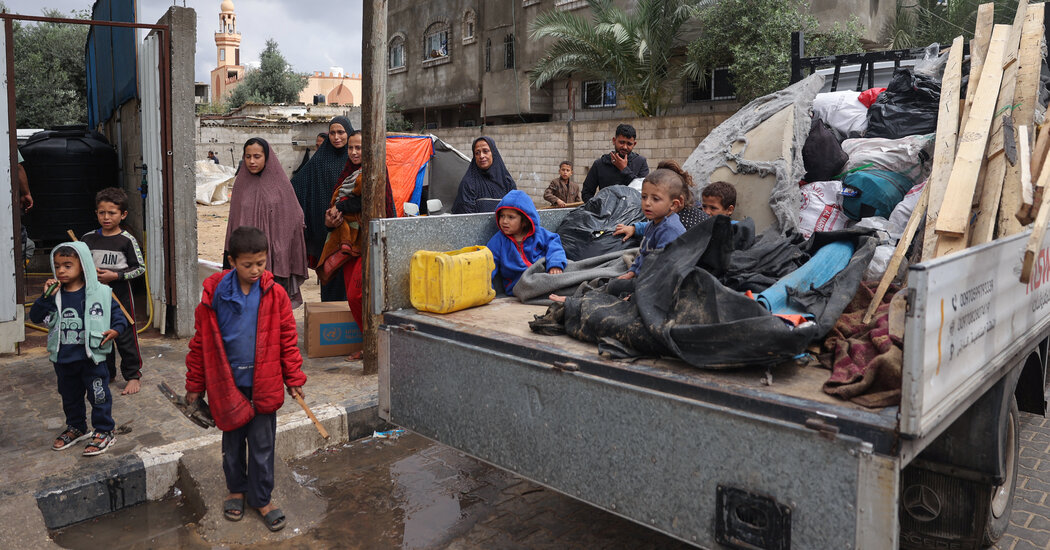The latest round of negotiations between Israel and Hamas hit an impasse on Sunday as mediators struggled to bridge remaining gaps and a Hamas delegation departed the talks in Cairo, according to two senior Hamas officials and two other officials familiar with the talks. An Israeli official also confirmed the negotiations had stalled and described them as being in “crisis.”
For months, the negotiations aimed at achieving a cease-fire and a release of hostages have made little progress, but signs the two sides were coming closer to an agreement appeared over the last week. Israel backed off some of its long-held demands and a top Hamas official said the group was studying the latest Israeli offer with a “positive spirit.”
But the setback over the weekend meant Palestinians living in miserable conditions in Gaza would not experience an imminent reprieve and the families of hostages held by militants would have to wait longer for the freedom of their loved ones.
The main obstacle in the talks was the duration of a cease-fire, with Hamas demanding it be permanent and Prime Minister Benjamin Netanyahu of Israel expressing openness to only a temporary halt in the fighting.
Hamas blamed the lack of progress on Mr. Netanyahu, who vowed again in recent days that the Israeli army will invade Rafah, the southernmost town in the Gaza Strip, with or without an agreement.
“We were very close, but Netanyahu’s narrow-mindedness aborted an agreement,” Mousa Abu Marzouk, a senior Hamas official, said in a phone interview.
Mr. Netanyahu has for weeks declared his intention to stage a ground offensive aimed at Rafah, where about a million Palestinians have been sheltering. The Biden administration has been pressing Israel to refrain from undertaking a major operation in the city.
On Sunday, Hamas fired roughly 10 rockets from the area of the Rafah border crossing, killing three soldiers near the Kerem Shalom crossing, according to Israel’s military. Rocket attacks by Hamas have been relatively rare in recent months, and Israel said it had responded with airstrikes targeting the site of the launches.
The Israeli official who spoke on the condition of anonymity said that Israel and Hamas were closer to a deal a couple of days ago, but that Mr. Netanyahu’s statements about Rafah had compelled Hamas to harden its demands in an attempt to ensure that Israeli forces won’t enter the city. Hamas, the official said, was now seeking further guarantees that Israel would not implement only part of an agreement, and then resume fighting.
The official lamented that Hamas and Israel had shifted gears to playing a “blame game.”
Two U.S. officials, who spoke on the condition of anonymity, pushed back on the notion the talks were at an impasse, suggesting that parties were still reviewing details of the most recent proposals.
Mr. Netanyahu and the United States have been contending that Hamas was holding up an agreement. On Sunday, Mr. Netanyahu said he would not agree to the complete withdrawal of Israeli forces from Gaza and an end to the war. Countenancing such demands, he said, would allow Hamas to re-establish control over Gaza, rebuild their military capabilities, and threaten communities throughout Israel.
“It is Hamas that is holding up the release of our hostages,” he said. “We are working in every possible way to free the hostages; this is our top priority.”
An Israeli delegation never made it to Cairo for the latest round of talks. The Israeli official said that Israel had sought a written response to its latest proposal from Hamas before dispatching a delegation, but that the group never conveyed one.
Mr. Abu Marzouk said Hamas had wanted Israel to be present at the talks in Cairo, where they could have worked through mediators to clarify “vague” points in the latest Israeli offer, including on the duration of a cease-fire.
“The cease-fire needs to be permanent and fixed,” he said.
Mr. Abu Marzouk was the only one of the officials who spoke about the talks to allow the use of his name. The others spoke on the condition of anonymity to discuss the sensitive subject or because they were not authorized to speak to the press.
Hamas, Mr. Abu Marzouk said, thought that Mr. Netanyahu wanted an agreement that would permit Israel to invade Rafah after its hostages are released.
“This is Netanyahu’s plan,” he said.
A technical team from the Qatari foreign ministry also left the Egyptian capital on Sunday, two officials briefed on the talks said. Bill Burns, the director of the Central Intelligence Agency, met with Qatari Prime Minister Mohammed bin Abdulrahman Al Thani in Doha on Sunday to discuss getting the talks back on track, one of the officials said.
On Monday, Hamas’s political leadership will convene in Doha to discuss what unfolded in Cairo over the past two days, but the group intended to continue participating in negotiations with “positivity,” said one of the senior Hamas officials, who spoke on the condition of anonymity.
A report in Al-Qahera News, an Egyptian state-owned television channel, said that a Hamas delegation would return to Cairo on Tuesday, but the senior Hamas official said that the group hadn’t made a decision yet.
Peter Baker and Michael Crowley contributed reporting to this article.


